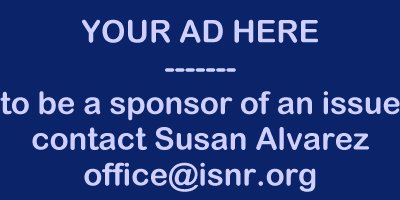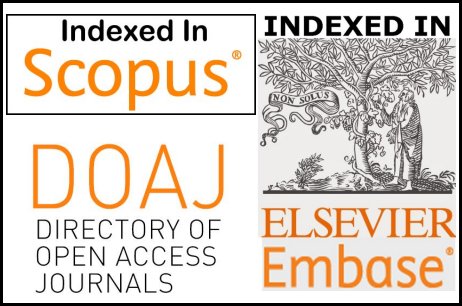About the Journal
NeuroRegulation is open access with no submission fees or APC (Author Processing Charges) and an expedited publication timeline. This journal is the official publication of the International Society for Neurofeedback and Research (ISNR) and is indexed in the Abstracting & Indexing databases of Scopus, Elsevier's Embase, DOAJ, and Google Scholar and carries a CiteScore impact factor from Scopus. [ISSN: 2373-0587]
Focus and Scope
NeuroRegulation is a peer-reviewed journal providing an integrated, multidisciplinary perspective on clinically relevant research, treatment, reviews, and public policy for neuroregulation and neurotherapy. NeuroRegulation publishes important findings in these fields with a focus on electroencephalography (EEG), neurofeedback (EEG biofeedback), quantitative electroencephalography (qEEG), psychophysiology, biofeedback, heart rate variability, photobiomodulation, repetitive Transcranial Magnetic Simulation (rTMS) and transcranial Direct Current Stimulation (tDCS); with a focus on treatment of psychiatric, mind-body, and neurological disorders. In addition to research findings and reviews, it is important to stress that publication of case reports is always useful in furthering the advancement of an intervention for both clinical and normative functioning.
We strive for high quality and interesting empirical topics presented in a rigorous and scholarly manner. The journal draws from expertise inside and outside of the International Society for Neurofeedback & Research (ISNR) to deliver material which integrates the diverse aspects of the field, to include:
*basic science
*clinical aspects
*treatment evaluation
*philosophy
*training and certification issues
*technology and equipment
Publication Frequency
NeuroRegulation is published quarterly. Beginning in 2016, the publication months are: March, June, September, and December. (In 2014 and 2015 the publication months were: April, July, October, and December).
Open Access Policy
This journal provides immediate open access to its content on the principle that making research freely available to the public supports a greater global exchange of knowledge.
Peer Review Process
NeuroRegulation is a peer-reviewed journal. Editorial decisions are based on the relevance of a manuscript to the journal as well as the manuscript’s originality, quality, and contribution to evidence about important questions. Submitted manuscripts are initially pre-reviewed to ensure adherence to Author Guidelines and journal suitability; afterwhich, the designated Editor/Associate Editor will either 1) approve the manuscript for the peer review process, or 2) provide pre-review feedback with revision suggestions or the reason it is not an appropriate manuscript for NeuroRegulation. Reviewed manuscripts may be accepted as submitted, accepted conditional on satisfactory revisions, require revisons prior to further review, rejected encouraging revision and resubmission, or rejected. For a detailed depiction of the editorial/review flow process click HERE.
Editorial Roles in review process: The Editor-in-Chief (EiC) reviews all manuscripts; approves/rejects all submissions; manages the submission review/revision process or assigns an editor (i.e. Executive or associate/section) to do so; approves final issue proofs before publication. Peer-reviewed manuscripts are assigned 2-3 reviewers (inclusive of EiC). During the manuscript review the process is single-blind; however, names of the manuscript editor and reviewers are listed in the published article; thus, ultimately being an open review process. Editors (other than EiC) recommend approval/revisions; EiC makes final determination of submission. Editors and Reviewers are expected to adhere to the journal's stated Publication Ethics and Malpractice Guidelines posted on both the "About" page and "Submission" pages.
Sponsors
One aspect of this journal which is quite novel for an open access journal, is there is no submission fee to authors. Most open access journal’s charge the author to publish (rather than the reader) to access the journal. The ability to offer a no-fee open access journal is due to the generous sponsorship provided by the International Society for Neurofeedback & Research (ISNR) who host the journal.
Advertising / Sources of Support
A limited number of advertisement spaces are available and only displayed in the sidebar of the journal website (never within issues or attached to pages). Ethical considerations are in place to ensure the integrity of the journal and its content. Ad sales are arranged and managed by the headquarters office of ISNR; however, the Editor-in-Chief/Executive Editor have full and final approval over the content of all advertisements. Advertisers have no control or input over the location of where ads appear. Advertisers will never be shown any manuscripts or other content prior to publication. See our home page for current issue adversiters.
Journal History
NeuroRegulation represents an exciting new direction for the scientific and publishing arm of the International Society for Neurofeedback & Research (ISNR). After a long run of 17 volumes, with the end of the Journal of Neurtherapy, an opportunity existed to totally re-evaluate the needs of the members of ISNR and of the scientific community at large. To this end a decision was made to move from a traditional hard copy format to an electronic journal.
This trend across all academic fields is now making the latest scientific advances in all fields available to everyone, not just those who are members of a society or have access to a tertiary education library. Electronic journals have also increased the speed at which knowledge is disseminated. In the past, the ‘latest research’ could actually be anything up to two years or more older before it was made available to the wider community. Electronic journals have seen this timeframe dramatically cut, which can only be good for any scientific endeavour. In relation to our field, this can only be seen as a good step. Clinicians are constantly looking for the latest knowledge and development in treatment options and an open access format will facilitate this. There are also many clinicians globally who do not have access to this information in hard copy. Now all they need is access to the internet to stay abreast of advances within the field.
Publication Ethics and Malpractice Guidelines
NeuroRegulation is committed to high ethical and professional standards in publication as well as scholarly quality in the articles it publishes. As such, it is expected that, along with the Publisher, Authors, Reviewers, and Editors and will conform to standards of ethical behavior as outlined in the Author Guidelines and outlined as follows:
Authors: Authors are expected to ensure they have written the submission and to submit work which is entirely original works; if others’ works or words are used, appropriate acknowledgement is provided. All forms of plagiarism or other unethical behavior, such as knowingly including inaccurate statements, are unacceptable. It is expected that authors have significantly contributed to the work and not only present accurate accounts of their original research, but also include an objective discussion regarding its significance. Review papers are expected to be comprehensive, objective, and accurate accounts of the review topic. It is unethical to concurrently submit the same manuscript to more than one journal is considered unethical publishing behavior and is not acceptable. Therefore, during this journal’s submission process authors must attest that their manuscript is only submitted to this journal. It is encumbent on the corresponding author to ensure full consensus of all co-authors prior to submitting the original manuscripts and revised versions of the final version of the paper. Authors are expected to provide corrections or retractions of mistakes, when discovered.
Reviewers and Section Editors: It is expected that reviewers and/or section editors will consider and treat submitted manuscripts, as well as information and ideas acquired during peer review, as confidential and/or not to be used for personal advantage. Reviewers and/or Section Editors shall not use unpublished content from a submitted manuscript without expressed written consent from the authors. Should a reviewer discover they have conflicts of interest from collaborative, competitive, or other relationships with any of the authors, companies, or institutions connected with the manuscript, they should notify the Editor and excuse themselves from the paper review. Requested reviewers should contact the editor should they feel unqualified to review the manuscript, or knows they cannot conduct a review within the requested time frame. In order for the review process to aid authors in improving the manuscript, reviews should be performed objectively, with clearly formulated observations with supporting arguments. Moreover, reviewers should point out relevant published works which the authors have not yet cited. Reviewers should immediately bring to the editor’s attention any significant similarity or overlap between the paper under consideration and other published paper for which the reviewer has personal knowledge.
Editors: Editors at all levels are expected to take reasonable steps to identify and prevent publication of manuscripts which involve research misconduct. Editors shall not encourage such misconduct, unethical behavior, or knowingly allow such behavior to take place. The Editor-in-Chief will appropriately address any allegation of research misconduct or unethical behavior, up to and including the potential for retracting articles when needed. Editors are expected to be willing to publish clarifications, correction, retractions and/or apologies when needed.
Policy on Article Corrections, Retractions and Editorial Expressions of Concern
NeuroRegulation is committed to correct the errors in published papers according to guidelines set by international organizations such as Committee on Publication Ethics (COPE, see this link of flowcharts ). Issues requiring corrections to, or retractions of, or editorial expressions of concern, regarding published articles will be made by publishing an erratum/corrigendum or editorial expressions of concern or retraction, in article form, without altering the original article. Thus the original article remains in the public domain and the erratum/corrigendum or note will be widely indexed.









